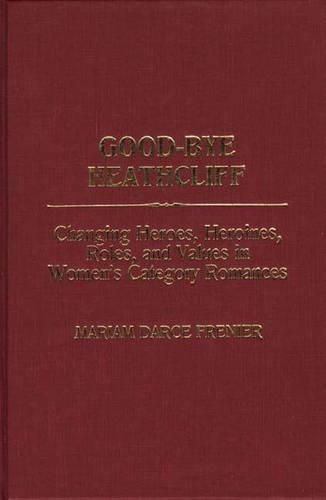
Good-Bye Heathcliff: Changing Heroes, Heroines, Roles, and Values in Women's Category Romances
(Hardback)
Publishing Details
Good-Bye Heathcliff: Changing Heroes, Heroines, Roles, and Values in Women's Category Romances
By (Author) Mariam Darce Frenier
Bloomsbury Publishing PLC
Praeger Publishers Inc
3rd June 1988
United States
Classifications
Tertiary Education
Non Fiction
823.08509
Physical Properties
Hardback
122
Description
Virginal Heroines, young and naive but seething with passion, change sardonic heroes into loving, monogamous husbands. Such romance novel characters and themes have been transformed by the women's movement, argues history professor Frenier in this convincing, well-researched study. Frenier surveys earlier feminist studies of women's romances and traces the evolution of the romance industry, focusing on the competition between Harlequin's more traditional British writers and the American authors of Silhouette. She finds undertones of rape and violence in late 1970s novels giving way to more explicit and equal sexuality, to gentler, more nurturing heroes matched with stronger, more experienced heroines. By the late 1980s, premarital sex and women's careers are assumed in many novels, but the heroines greatest power remains her ability to inspire her hero to addictive, obsessive love . . . the subject is fascinating. Booklist Now claiming an audience that includes nearly one-third of adult women in the United States, popular romance fiction is holding its own against competing media and has shown an ability to keep abreast of changing tastes. In the first recent book-length analysis of the subject, Frenier looks at developments in this literary genre in light of feminist issues and the pervasive social changes that continue to affect women in the post-World War II decades. Exploring traditional and more contemporary depictions of romantic heroines, as well as changing approaches to sexuality, she assesses the degree to which the values of the sexual revolution and women's movement have penetrated this form of popular culture.
Reviews
Virginal heroines, young and naive but seething with passion, change sardonic heroes into loving, monogamous husbands. Such romance novel characters and themes have been transformed by the women's movement, argues history professor Frenier in this convincing, well-researched study. Frenier surveys earlier feminist studies of women's romances and traces the evolution of the romance industry, focusing on the competition between Harlequin's more traditional British writers aand the American authors of Silouette. She finds undertones of rape and violence in late 1970s novels giving way to more explicit and equal sexuality, to gentler, more nurturing heroes matched with stronger, more experienced heroines. By the late 1980s, premarital sex and women's careers are assumed in many novels, but the heroines greatest power remains her ability to inspire her hero to addictive, obsessive love. . . the subject is fascinating . . .-Booklist
"Virginal heroines, young and naive but seething with passion, change sardonic heroes into loving, monogamous husbands. Such romance novel characters and themes have been transformed by the women's movement, argues history professor Frenier in this convincing, well-researched study. Frenier surveys earlier feminist studies of women's romances and traces the evolution of the romance industry, focusing on the competition between Harlequin's more traditional British writers aand the American authors of Silouette. She finds undertones of rape and violence in late 1970s novels giving way to more explicit and equal sexuality, to gentler, more nurturing heroes matched with stronger, more experienced heroines. By the late 1980s, premarital sex and women's careers are assumed in many novels, but the heroines greatest power remains her ability to inspire her hero to addictive, obsessive love. . . the subject is fascinating . . ."-Booklist
Author Bio
MARIAM DARCE FRENIER is Associate Professor of History at the University of Minnesota.
